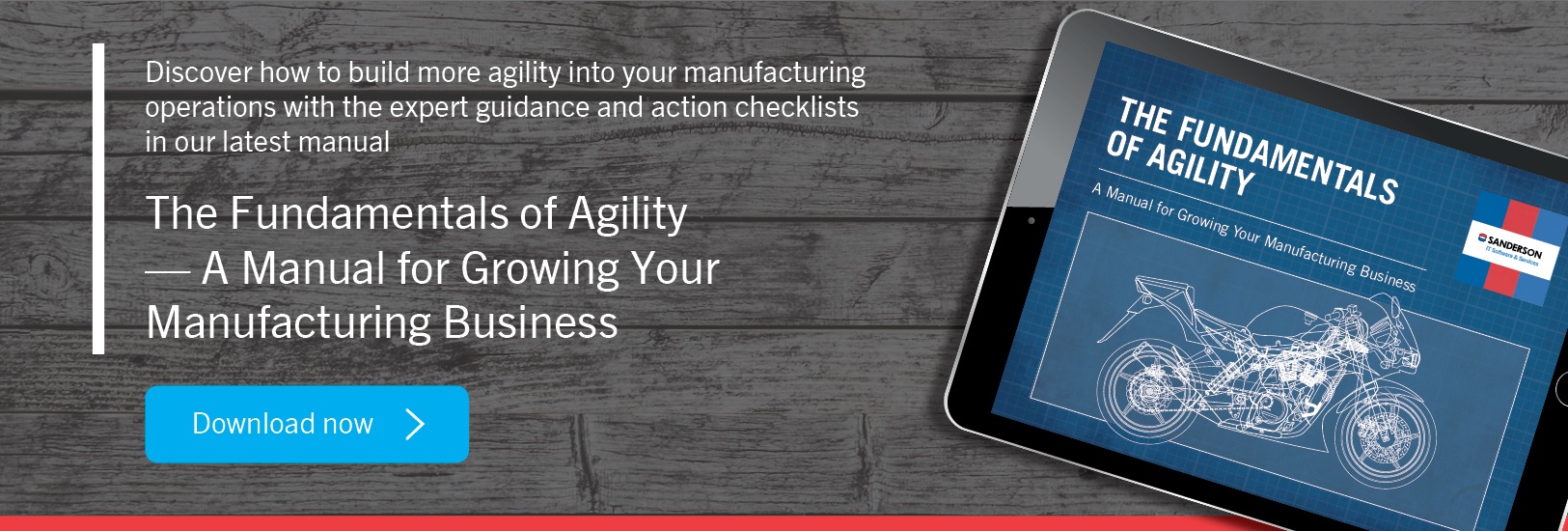Riding the Brexit Rollercoaster ‒ How Agile Manufacturers Stay on the Rails
Prepare for any unpredictable times ahead with agile manufacturing
/Riding%20the%20Brexit%20Rollercoaster-header.jpg?width=777&height=348&name=Riding%20the%20Brexit%20Rollercoaster-header.jpg)
The fall in sterling after the Brexit referendum was widely seen as good news for UK manufacturers selling overseas. However, despite the CBI and EEF reporting booming export orders, this growth did not show up in official statistics. ONS data shows that UK growth actually slowed in June and manufacturing output stayed flat. Although July’s data was more positive, the ONS was still describing manufacturing as ‘subdued’.
It’s no wonder UK manufacturers feel like they’re on a rollercoaster: up one minute, down the next, and unable to see what’s around the corner. According to the EEF, the uncertainty over Brexit will continue to weigh heavily on the UK’s manufacturing sector over the next 12 months.
This unpredictability is all the more reason to adopt an agile manufacturing approach. Agile manufacturing means responding quickly to customer needs and market changes while controlling costs and quality. It involves seamlessly gathering data and presenting it in a way that gives a clear picture of performance in all aspects of your business. You can then control production processes to drive improvements and productivity.
Here are some specific areas where agile manufacturing can help in uncertain times:
1. Monitoring fluctuating material costs
While the weak pound may help export sales, it makes the cost of imported materials difficult to forecast. As profit margins are already tight, price fluctuations need to be carefully monitored.
With smart stock control processes, manufacturing ERP systems will help you balance material lead times with sales demands. Integrating that data with your supply chain management can result in smarter buying from preferred suppliers. With end-to-end tracking, vendor management and procurement controls, you’ll know what materials are needed, and when and where to get the best deals.
2. Improving productivity
UK productivity rates are already lower than in Europe and further afield. With the pressures of Brexit, rates could fall even lower, making UK products uncompetitive. Manufacturers need the technology, equipment and processes that improve efficiency, cut costs and improve performance.
From design stage through to the factory floor, you need systems that give you real-time information about costs and activity. Touchscreens can now replace paper recordkeeping on the shop floor to accurately capture labour - and its true impact on profitability. Configurable dashboards and reporting will show progress and help with decision making so you can optimise capacity, reduce waste and avoid delays. With better visibility of operations and more control over resources, you’ll be able to work more flexibly and respond faster to changing conditions.
/Riding%20the%20Brexit%20Rollercoaster-1%20(1).jpg?width=777&height=200&name=Riding%20the%20Brexit%20Rollercoaster-1%20(1).jpg)
3. Managing administration
One of the main concerns about Brexit is that changes like a new customs arrangement will increase the amount of administration and recordkeeping required for goods. Manufacturing is already struggling to attract skilled talent, so recruiting extra admin staff to cope with more paperwork is an unwelcome distraction and cost. Additional admin also puts manual systems under strain leading to time-consuming workarounds and mistakes.
Automated digital systems that progress jobs using triggers will be essential to bring disparate systems together and streamline processes to improve efficiency. Document management systems can manage version control to improve record keeping. So from safety certificates to engineering changes, you’ll have an audit trail to enforce quality standards.
4. Controlling finances
In difficult times, it can be tempting to take on all available work, even if it turns out to be unprofitable. This makes it critical to have a financial reporting system that gives a comprehensive view at any time of your costs so you can accurately predict your bottom line. If you can be confident of your costs, cash flow and inventory, you will be to pick and choose the orders that will grow your business.
Despite high levels of uncertainty, the UK’s manufacturers are proving to be remarkably resilient, capitalising on the fall in sterling to develop export opportunities where they can. While optimism abounds ‒ 90% expect to see revenue growth in 2017 ‒ there’s no doubt that strategies will be required to manage the risks of Brexit, both the short-term uncertainty and longer-term outcomes. Investing in agile manufacturing to find better, faster ways of doing business will help manufacturers to thrive in the changing times to come.
Discover how to build more agility into your manufacturing operations with the expert guidance and action checklists in our latest manual
Topics: Manufacturing




